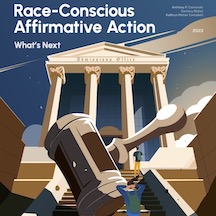 A new report from the Center on Education and the Workforce in the School of Public Policy at Georgetown University in Washington, D.C., examines the probable impact of the expected Supreme Court decision to prohibit the consideration of race in the college admissions process. The authors find that the racial and ethnic diversity of students at selective colleges will decrease significantly unless these colleges fundamentally alter their admissions practices.
A new report from the Center on Education and the Workforce in the School of Public Policy at Georgetown University in Washington, D.C., examines the probable impact of the expected Supreme Court decision to prohibit the consideration of race in the college admissions process. The authors find that the racial and ethnic diversity of students at selective colleges will decrease significantly unless these colleges fundamentally alter their admissions practices.
Researchers examined different admissions models and the impact they would likely have on racial/ethnic and socioeconomic diversity if used consistently across selective colleges. One model would consider academic merit only (grades and test scores). Another would consider only high school class rank. Two models specifically consider class-conscious admissions as alternatives to race-conscious admissions.
The authors found that substituting class-conscious affirmative action for race-sensitive admissions could maintain a high level of racial diversity at the nation’s most selective colleges and universities. But they warn that this method would retain racial diversity “only if all selective colleges used class-conscious admissions practices and considered a much larger and more diverse pool of applicants for admission. Unfortunately, neither of these conditions seems very likely.”
The report concludes: “While the findings indicate that class-conscious admissions models could help selective institutions partially claw back the levels of racial/ethnic diversity currently present among enrolled students, they also demonstrate that maintaining or exceeding existing levels of representation without race-conscious admissions would require a complete transformation of the admissions system. Selective colleges would need to change both how they evaluate applicants and whom they consider for admission. In sum, when it comes to the goal of equalizing college opportunity across advantaged and disadvantaged racial/ethnic and socioeconomic groups, there is no good substitute for the consideration of race.”
“The barriers to educational opportunity that stem from race and class are connected but distinct. As a result, when it comes to the goal of equalizing college access and success across advantaged and disadvantaged racial and ethnic groups and across advantaged and disadvantaged socioeconomic groups, there is no good substitute for the joint consideration of both race and socioeconomic status in college admissions,” said Zack Mabel, a research professor at Center on Education and the Workforce and a co-author of the report. “Without race-conscious admissions, the role selective colleges play in creating equal opportunity in our society is likely to diminish.”
The full report, Race-Conscious Affirmative Action: What’s Next? may be downloaded here.


Jah & Jahes love. The class-conscious admissions method does not work. Some years ago, when Affirmative Action for BIPOCs was eliminated, Texas adopted the top 10% admission policy, pooling students ranked within the top 95% percentile. But, this policy has not gotten the diversity of students in the Colleges and Universities that they thought it would. I saw that same practice at UC Berkeley where the policy was discontinued. The number of Black students entering classes has greatly diminished. Black descendants of enslaved people and the Natives or Indigenous folks must DEMAND their fair share of the admissions. This can be considered part of the REPARATION package for both groups whose ancestors were genocide and enslaved to build this country. And, without College and University degrees they will not survive the problems of racism, ethnocentrism, and class hierarchies that were caused by colonialism, genocide, and slavery.